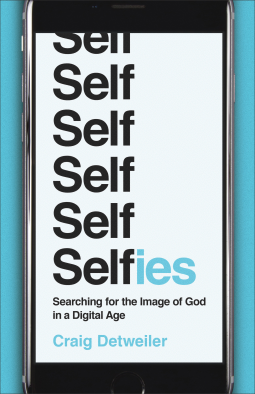
Selfies
Searching for the Image of God in a Digital Age
by Craig Detweiler
This title was previously available on NetGalley and is now archived.
Send NetGalley books directly to your Kindle or Kindle app
1
To read on a Kindle or Kindle app, please add kindle@netgalley.com as an approved email address to receive files in your Amazon account. Click here for step-by-step instructions.
2
Also find your Kindle email address within your Amazon account, and enter it here.
Pub Date Apr 03 2018 | Archive Date Jun 04 2018
Baker Academic & Brazos Press | Brazos Press
Talking about this book? Use #Selfies #NetGalley. More hashtag tips!
Description
Craig Detweiler, a nationally known writer and speaker and an avid social media user, examines the selfie phenomenon, placing selfies within the long history of self-portraits in art, literature, and photography. He shows how self-portraits change our perspective of ourselves and each other in family dynamics, education, and discipleship. Challenging us to push past unhealthy obsessions with beauty, wealth, and fame, Detweiler helps us to develop a thoughtful, biblical perspective on selfies and social media and to put ourselves in proper relation to God and each other. He also explains the implications of social media for an emerging generation, making this book a useful conversation starter in homes and churches. Each chapter ends with discussion questions and a photo assignment for creating a selfie in response to the chapter.
Advance Praise
"Craig Detweiler’s Selfies helps us journey beyond our narcissistic culture, giving us language to move away from an ego-filled self-expression to our true identities hidden in Christ. Reflecting Detweiler’s impressive grasp of art history and deep wisdom attained in media ecology, Selfies is both an invaluable guide for understanding our techno world with all its trappings and a book full of delightful observations."—Makoto Fujimura, artist and director of the Brehm Center for Worship, Theology, and the Arts, Fuller Theological Seminary
"I don’t know anyone who can connect the dots between centuries of church history and twenty-first-century selfies like Craig Detweiler. This book has changed the way I think about the images I see and share as well as the image of God in all of us."—Kara Powell, executive director, Fuller Youth Institute; coauthor of Growing Young
"Craig Detweiler takes us on a fabulous journey through history in search of the first selfie. Stories of Narcissus, Rembrandt, Bayard, and Kim Kardashian provide a fascinating backdrop for understanding why it feels so good to get the perfect shot of me."—Peggy Kendall, professor of communication studies, Bethel University; author of Reboot: Refreshing Your Faith in a High-Tech World
"Detweiler’s book is a Rosetta stone for people of faith bewildered by the seeming narcissism of the ubiquitous selfie. He taps the collective wisdom found in Greek mythology, art history, psychoanalysis, and media criticism to help translate biblical principles to this troubling use of technology. Selfies encourages readers to view the images of others and ourselves with compassion and curiosity and to see past the image to the collective longing to be known. It is a dare to forego the rush to judgment and instead to linger and learn."—Lisa Swain, associate professor of cinema and media arts, Biola University
"Craig Detweiler has done it again. Selfies is a pragmatic sociotheological examination of social media use among many young adults and youth. Detweiler presents us with a critically informed view of current media consumption that asks all of us, How do we consume and do we realize what we consume? This brilliant book does not simply bash media but critically explores it while presenting the good, the bad, and the very ugly. A must-read for anyone who spends even a minute on the internet or near any media outlet."—Daniel White Hodge, associate professor of intercultural communication, North Park University; author of Homeland Insecurity: A Hip-Hop Missiology for the Post–Civil Rights Context
Available Editions
| EDITION | Other Format |
| ISBN | 9781587433986 |
| PRICE | $22.00 (USD) |
| PAGES | 240 |
Featured Reviews
 Sergiu P, Reviewer
Sergiu P, Reviewer
This is a decent and in depth look at the Selfie phenomenon that is overtaking the culture. The author goes through a history of paintings, novels, movies, etc, in order to draw principles and relate those movements with the current selfie movement.
He also proposes several procedures by which we can get out of a superficial lifestyle that drives the current selfie movement and move towards a more robust, deep, lifestyle focused on serving others and glorifying God.
Selfies Searching for the Image of God in a Digital Age appealed to me because I am interested in how theology changes as technology does. But this book wasn't for me; I read the intro and the first three chapters, but never really saw a way to create a "thoughtful, biblical perspective" on the topic.
The book is mostly art history which might be interesting to some. I might have even enjoyed that if i was looking for art history. But I was looking for spiritual context and the biblical stories and thoughts I saw in each chapter seem to be thrown in and don't fit smoothly;y into the topic.
Maybe the deep biblical perspective comes later, but I have a list of other spiral books I want to read and I feel will benefit me more, so I decided to move along.
 Michelle K, Reviewer
Michelle K, Reviewer
Selfies
Searching for the Image of God in a Digital Age
by Craig Detweiler
Baker Academic & Brazos Press
Brazos Press
Christian ,
Entertainment
Pub Date 20 Mar 2018
I am reviewing a copy of Selfies through Brazos Press and Netgalley:
We live in a generation of selfies, anyone with a smart phone or tablet can post a selfie on social media from just about anywhere in the world, but do we truly understand the power of a selfie? It can capture a happy moment, a silly moment but there are times they can breed controversy.
The Smiling Selfie in Auschwitz was a way for Breanna to connect with her deceased Father, but after it was posted online outrage ensued. Was a smiling Selfie in Auschwitz disrespectful, or distasteful.
There are times that Selfies can be downright dangerous, stopping to take a selfie while crossing a busy street is never a good idea.
Selfies can be good or bad, it's up to us how we use them.
I give Selfies five out of five stars!
Happy Reading!
 Conrade Y, Reviewer
Conrade Y, Reviewer
The invention of the self-facing camera has also invented another word in our popular language: Selfie. On the surface, it seems like some harmless photograph for keepsake. Since everybody's doing it, it should be ok, right? Not so fast. There are more things happening below the surface consciously and sub-consciously. According to author and professor Craig Detweiler, it is something that reveals our conflicted thoughts about ourselves. Instagram, Snapchat, Twitter, Facebook Live, and all kinds of social media apps are able to help us capture precious selfie moments. What they fail to capture is the underlying philosophies or meanings attached to such selfie movements. Enter this book that reflects on the meanings, the conflicts, the pluses and minuses of this cultural phenomenon. With selfies, there is no longer private moments but public. There are no longer just self-image but shared images. Anything we put out there is subject to a multitude of interpretations and criticisms. With technology that are increasingly self-learning and automated, every selfie we take could be automatically uploaded the moment our devices establish an Internet connection. With our increasing array of digital devices, multiple copies could be backed up or shared across different platforms and distributed throughout our social and public spheres. Whether it is to bolster our self-image or simply to have our pictures on some famous landmark, Detweiler helps us ask questions to distill this phenomenon into some fundamental self identity and our endless search for meaning, and more importantly for God.
We learn about identity from both via positiva (who we are) as well as via negativa (who we are not). It is a search for our self-image as part of our identity crisis. Contrary to what some readers may think, this book is not accusing selfies as the problem. It is using the selfie phenomenon to highlight something deeper and more profound about ourselves. The author calls selfies "as the start of a solution." What is this solution? That is what this book will explain. As an extension to Detweiler's previous book, iGods, this book looks at the selfie phenomenon from a Christian perspective. Some highlights include:
Understanding the origins of narcissism
Looking back at the influence of the Renaissance in self-portraits
How writers search for identity in their literary creative pieces
How to read a photograph
The psychological perspective
Our present cultural environment
Augmented reality with social media apps
The author masterfully weaves the past with the present, and with biblical principles as guide, show us the redemptive side of things. It is easy to criticize or condemn the use of selfies. The general attitude adopted in this book is to hold our critiques, and to practice more listening, more observing, more understanding, and more discerning. For underlying each selfie act, there is a person that is loved by God. There is someone in search of self. There is a general response to the restlessness happening inside every human person. We are all in search of God, albeit in different places. Selfies is one avenue that more and more people are searching for God, often without themselves knowing about it. Each chapter ends with questions to consider and discuss, which could be used for both personal and group settings. This is then followed by a "selfie challenge" to help us analyze ourselves and our selfies beyond aesthetics.
My Thoughts
First, I agree with Detweiler that the selfie phenomenon is an extension of something deeper. What makes Google such a success? Why is YouTube one of the hottest websites on the Internet? How do people navigate the Internet so proficiently? It's the powerful ability to search. With Google, one almost always gets the information one seeks after. Most of the desired music videos, fun clips, news reports, movie trailers, documentaries or tips about anything, could be found on YouTube. Imagine the Internet without a search engine. We would be lost. From mapping destinations to restaurant reviews, online dating to academic research, the Internet is here to stay. Anything could be searched for at anytime, anywhere, and by anybody. If there is one common denominator in all of these, it is the word "search." What are people searching for? Is there a common thread in their search patterns? Perhaps, it is a restless spirit since the days of Cain. Pop culture does reflect the inner longings of the human heart in many ways. Whether we are searching for love in all the wrong places or searching for information to get at what we want, most of us do not seem to be satisfied with what we get. With the invention and subsequent popularity of the selfie, the restless spirit has not stopped searching. Instead, it is searching for the same thing albeit via a different mechanism. In this book, author Craig Detweiler highlights the restless human heart wanting to find fulfillment of the self, through the digital gadgets and mediums. In the Internet world, we are often what we search. In the selfie world, we are what we want to see ourselves in.
Second, we need to be aware of how public our own selfies could become. This could invite all kinds of feedback and criticisms in ways we could not possibly expect. For example, one of the most outrageous selfies taken is Breanna's selfie taken with Auschwitz concentration camp as the background. In one image, it is perceived as mocking the deaths of over six million Jews massacred during the horrific Holocaust. For whatever reason, there is a sense of desire to have our photographs taken in famous places, and to publicly tell the world that we've been there and done that. Why? Detweiler in his article on CNN about Auschwitz recognizes an inner conflict in people taking selfies. On the one hand, are people taking selfies all selfish and insensitive? On the other hand, is there more than meets the eye? Is there something meaningful to be discovered? Truth is, there are cases in which selfies could be deadly. People have fallen from cliffs and tall buildings just to snap a photo up high. They have also been gored to death by bulls; hurt in car crashes; and many different scenarios that place themselves at risk.
Third, I appreciate Detweiler's gentle approach with regard to the selfie phenomenon, not to condemn but to understand. While he states up front about the nature of selfishness of the selfie phenomenon, he reminds us that this is fairly recent although one could argue that selfishness could be lumped together with at least one of the seven cardinal sins: Pride. One word best describes Detweiler's position: A Mixed reception that demands a wise disposition. That means, instead of merely doing what everyone else is doing, ask why? For every temptation to take a picture of ourselves behind anything famous or infamous, pause and ponder if we have taken too many. Moderation is key. Awareness is vital. If we uncritically throw ourselves into every selfie self-promotion, we may not only stir up self-promotion responses in others, we also elevate our self-importance above God. Understand that selfies are simply an augmentation of our original sinful disposition, which is incurvatus in se "Latin for curved in on ourselves." Hear the warning:
"The greatest danger selfies pose may be not to our bodies but rather to our souls, our psyches, our selves. When we make our private moments public, something volatile may occur, as Princess Breanna discovered. Thanks to social media, our selfies become an occasion for a public referendum. Our friends and followers can now vote on our appearance, adding commentary, even forwarding it on to others. Our private moments veer quickly toward public property, fair game for memes and repurposing in a myriad of ways. While it can be gratifying to feel the affirmation of the crowd, it can also be devastating when our posts fail to generate the kinds of attention we seek."
The need to be gentle in understanding and intentional in indirect resistance is important. Like weeds that are growing together with cherished plants, we do not want to become another additional image of Christians objecting to another modern anomaly. Instead, take a selfie but don't let selfies take charge. Worship God but remember: Thou shalt not have any selfie before the LORD.
Rating: 5 stars of 5.
conrade
This book has been provided courtesy of Brazos Press and NetGalley without requiring a positive review. All opinions offered above are mine unless otherwise stated or implied.
 Allyson W, Reviewer
Allyson W, Reviewer
When I saw the title of Craig Detweiler's latest book, I was expecting to read a screed about today's latest technology craze. Instead, it was a thought-provoking investigation into the history of self-portraiture and what our current obsession may reveal about the heart. I confess being late to the party, having acquired my first cellphone 4 months ago. I'm more likely to take a photo of my thumb than a bona fide selfie.
Detweiler begins with the the Greeks and the legend of Narcissus. He moves on to the Renaissance painters and their enthusiasm for self-portraits once the mirror was perfected. He talks about writers and autobiography and memoir-ish novels. Even the Puritans practiced documenting their lives in the form of diaries. The development of photography warrants its own chapter. All of this history is thoroughly documented in the footnotes. About 25% of the book is footnotes.
The author considers selfies as a search for God via the imago dei. The preoccupation with self-imaging reveals a yearning for understanding and approval. Not all selfie takers are narcissistic. Some want to communicate with family spread far and wide geographically. Some are journaling in a new medium much as the Puritan diarists.
Instead of criticizing youth for their selfie galleries, Detweiler urges us to look beyond the photos to what the images reveal about the person. What are their hurts? their dreams? how they see themselves? Young people today are forced to grow up in public. Photos may go viral to a teen's great shame. Impression management is a 24/7 exhausting burden.
At the end of each chapter the author has discussion questions AND selfie photo exercises. I would love to read this book again within a small group. There is much to discuss and try out.


















